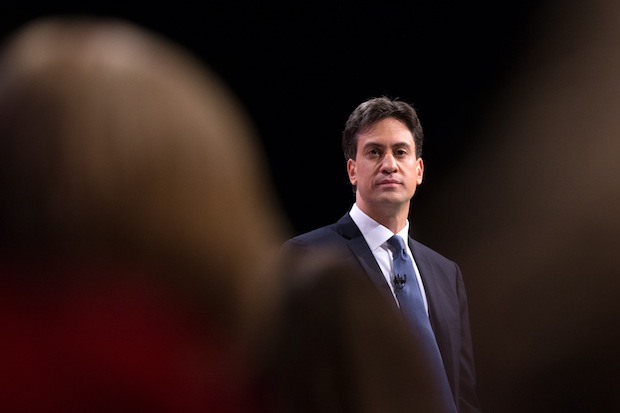This week has gone much better for Labour than many of its MPs thought it would. They started the week in very poor form indeed, grumpy after a bad conference, bruised after the narrow Heywood and Middleton result, and braced for good jobs figures to be published shortly before a very challenging PMQs.
But the party has narrowly avoided real meltdown once again. Had Ukip won Heywood, Labour would be in chaos, but it didn’t and instead those Labourites who do worry a lot about Ukip are now even more worried, which is still infinitely preferable to party uproar over a lost seat. Had Ed Miliband had a poor showing at PMQs, the worriers would have worried some more and encouraged other MPs to grow more doleful about next year’s result. MPs are aware that Miliband is not an asset on the doorstep, and poor performances only increase their nerves.
Ed was saved, though, at Prime Minister’s questions by Lord Freud. That the party had banked the clip of Lord Freud saying disabled people were ‘not worth’ the minimum wage (regardless of whether you think that flexibility on the wage would perhaps help some severely disabled people enter the workplace, it is those two words, ‘not worth’, that are so damaging and that make it so easy for Labour to shut down any rational debate) meant that PMQs went well in spite of everything being stacked against the party including the conference season, the Heywood and Middleton result, that morning’s jobs figures and even Miliband’s sore throat.
Lord Freud stayed high in the bulletins for 24 hours, even though he could survive as a minister. The Labour attack machine is clearly working well, and party figures claim they have more such clips waiting to be deployed, presumably at other points when the party looks as though it might struggle.
But the problem with taking these very effective attacks as evidence that the party is doing well is that Labour is relying on the Tories messing up in order to do well. None of this is about Ed Miliband’s own vision and leadership abilities: it is all about Conservative ministers with their feet in their mouths. Attacks that tell voters why they shouldn’t vote for another party are fine if they are accompanied by a vision that tells voters why they should vote for yours. The Tories often struggle with the same problem on Ukip: their strategy is mostly ‘don’t vote for Ukip because these bad things will happen’ rather than ‘these exciting policies show why you cannot afford not to vote Tory’.
And there is a huge amount of work already to do both to convince the electorate that Miliband’s party is safe to back, and to convince Labour MPs that it’s all going to be OK in the end. Many of them don’t think that. Last night’s Evening Blend email showed just how narrow the polls are currently, and the implied size of Labour’s majority. It’s not exactly thumping:

(You can subscribe to the Evening Blend, a free round-up and analysis of each day’s political developments, here).
One party figure mutters ‘we’re just waiting to get the general election over and done with so we can get on with the leadership contest’. There won’t be a leadership contest this side of the election, but it is significant that even previously loyal types are starting to think more about what will happen after an election they think they could lose than about what their party will do once it has won enough seas to form a government.
The low mood in the party seems to be based on most MPs expecting more than they’ve been given at this stage. Some were disappointed with Ed Miliband’s speech before it was delivered: the adviser briefing Labour MPs on its text described one section as ‘a kum ba yah bit’, which didn’t go down very well as those present thought the Labour leader probably needed to offer more than that at this stage.
Of course, other convenient events could help Labour out. If Ukip wins the Rochester and Strood by-election, then the delayed Tory uproar will begin. Conservatives held their breath after losing Clacton, leaving Labour exposed, even though the party had won Heywood. But a Rochester loss would buy Miliband more time. Sensible people might think this strategy of waiting for worse things to happen to your opponents than are happening to you is a little risky and suggests you are starting from a position of weakness. But until Miliband works out how to move on from being a bit ‘kum ba yah’, it’s better than nothing.







Comments